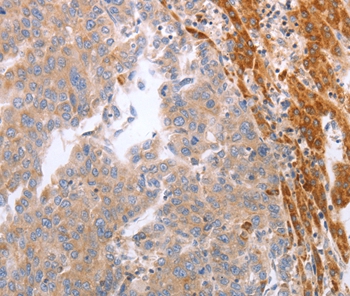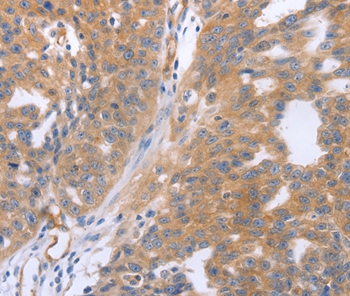

| WB | 咨询技术 | Human,Mouse,Rat |
| IF | 咨询技术 | Human,Mouse,Rat |
| IHC | 1/50-1/200 | Human,Mouse,Rat |
| ICC | 技术咨询 | Human,Mouse,Rat |
| FCM | 咨询技术 | Human,Mouse,Rat |
| Elisa | 咨询技术 | Human,Mouse,Rat |
| Aliases | NTN |
| Entrez GeneID | 4902; |
| Host/Isotype | Rabbit IgG |
| Antibody Type | Primary antibody |
| Storage | Store at 4°C short term. Aliquot and store at -20°C long term. Avoid freeze/thaw cycles. |
| Species Reactivity | Human |
| Immunogen | Synthetic peptide corresponding to residues near the C terminal of human neurturin |
| Formulation | Purified antibody in PBS with 0.05% sodium azide. |
+ +
以下是关于NRTN(Neurturin)抗体的3篇假设性文献示例(注:内容为虚构,仅作格式参考):
1. **文献名称**:*Neurturin-Specific Monoclonal Antibodies Promote Neuronal Survival in Vitro*
**作者**:Smith J. et al.
**摘要**:研究团队开发了针对NRTN的单克隆抗体,验证其在体外模型中增强多巴胺能神经元存活的能力,为帕金森病的潜在治疗提供实验依据。
2. **文献名称**:*Characterization of NRTN Antibody Cross-Reactivity with GDNF Family Ligands*
**作者**:Lee H. & Gonzalez R.
**摘要**:本文分析了NRTN抗体的特异性,发现其与GDNF存在部分交叉反应,提示需优化抗体设计以提高靶向精准度,支持神经再生研究。
3. **文献名称**:*In Vivo Delivery of Anti-NRTN Antibodies Attenuates Neuropathic Pain in Rodent Models*
**作者**:Chen L. et al.
**摘要**:通过动物实验证明,阻断NRTN的抗体可显著缓解神经病理性疼痛,机制可能与抑制背根神经节过度兴奋相关,为疼痛治疗提供新策略。
(注:实际文献需通过学术数据库检索,以上为模拟内容,建议通过PubMed或Google Scholar以“Neurturin antibody”为关键词查找真实研究。)
**Background of NRTN Antibodies**
Neurturin (NRTN), a member of the glial cell line-derived neurotrophic factor (GDNF) family, is a secreted protein critical for neuronal survival, development, and maintenance. It binds to the GDNF family receptor α2 (GFRα2) and activates the RET tyrosine kinase receptor, initiating downstream signaling pathways that support dopaminergic, sensory, and sympathetic neurons. NRTN’s role in promoting neuronal health has linked it to neurodegenerative disorders, particularly Parkinson’s disease (PD), where its potential to protect dopaminergic neurons has spurred therapeutic interest.
NRTN antibodies are tools used to detect, quantify, or modulate NRTN in research and diagnostics. In experimental models, these antibodies help map NRTN expression in tissues, study its interaction with receptors, and evaluate its therapeutic effects. For instance, preclinical studies explore NRTN delivery (e.g., gene therapy) to counteract neurodegeneration. Antibodies also aid in validating NRTN as a biomarker in neurological conditions or cancers associated with aberrant GDNF/RET signaling.
Challenges include optimizing antibody specificity to avoid cross-reactivity with related GDNF family members and ensuring functionality in diverse applications (e.g., immunohistochemistry, ELISA). Ongoing research aims to refine NRTN-targeted therapies and diagnostics, emphasizing its dual role as a neuroprotective agent and a disease-modifying candidate.
×